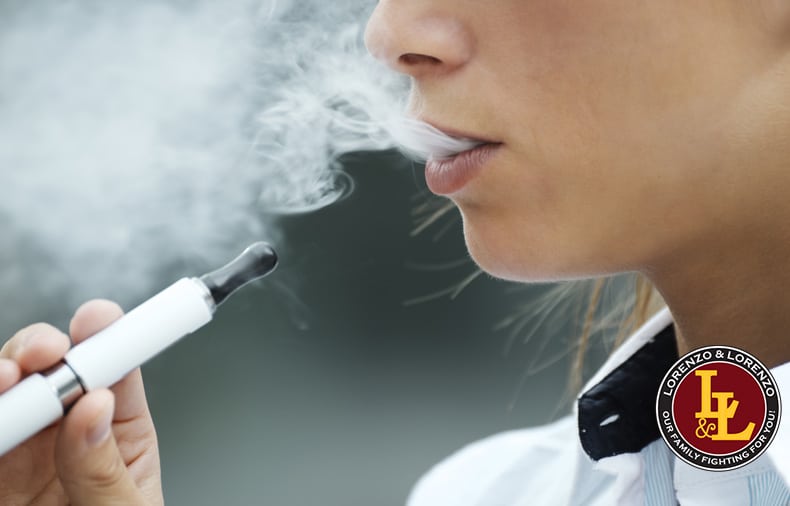
Learn about your legal options if you developed popcorn lung from vaping
Also known as bronchiolitis obliterans, popcorn lung is a rare but serious disease that damages the small airways in the lungs and can lead to severe breathing issues and even death. The condition got its nickname “popcorn lung” because of its association with workers in microwave popcorn plants who were exposed to high levels of diacetyl, a chemical used to create a buttery flavoring.
If you or a loved one is suffering from popcorn lung, read on for valuable information about the causes, symptoms and treatment of popcorn lung, as well as the compensation that may be available.
What products contain diacetyl besides microwave popcorn?
While its use in microwave popcorn is well-known, diacetyl can also be found in the following products:
- E-cigarettes and vape juices. Some flavored e-cigarettes and vape liquids have been found to contain diacetyl, although its use for this purpose is increasingly controversial due to health concerns.
- Dairy products. Natural diacetyl occurs in fermented dairy products like butter, cheese and sour cream.
- Snack foods. Crackers, chips, and other snack foods that have a buttery or cheesy flavor may contain diacetyl.
- Pet foods. Some pet foods that are designed to have a meaty or creamy flavor might contain diacetyl.
- Roasted coffee. Some flavored coffee and coffee creamers may contain diacetyl to enhance their buttery flavor profiles.
- Flavoring syrups. Some syrups used in cooking or as a coffee additive may contain diacetyl.
- Alcoholic beverages. Diacetyl naturally occurs during the fermentation process in some alcoholic beverages like beer and wine, although it’s usually present at low levels.
- Baked goods. Various types of baked goods like bread and pastries, especially those with a buttery flavor, might contain diacetyl.
- Cooking oils and sprays. Some cooking sprays and oils designed to have a buttery flavor may use diacetyl as a flavoring agent.
- Candy flavoring. Certain candies that are butter-flavored, such as certain hard candies or toffees, may contain diacetyl.
- Processed foods. Diacetyl is sometimes used in processed foods to create a creamy or savory flavor.
Due to health concerns, many manufacturers have reduced the use of diacetyl in their products, especially after the “popcorn lung” cases came to light. Some have switched to substitutes like acetoin, although the safety of these alternatives is also the subject of ongoing research.
What other substances are associated with popcorn lung?
Other toxic substances that have been shown to cause popcorn lung include:
- Hydrochloric acid
- Ammonia
- Sulfur dioxide
- Acetaldehyde
- Florine
- Mustard gas/sulfur
- Formaldehyde
- Nitrogen oxides
- Metal oxide fumes
How do I know if I have popcorn lung?
Signs and symptoms of popcorn lung typically develop over time and may include the following:
- Feeling excessively tired or experiencing a lack of energy
- Chronic cough
- Shortness of breath
- Wheezing
- Frequent respiratory Infections like bronchitis or pneumonia
- Decreased ability to engage in physical activities
- Chest tightness
- Skin rashes
- Night sweats
- Fever
It’s important to note that these symptoms can also be associated with other respiratory conditions, so a proper medical evaluation is necessary to confirm a diagnosis of popcorn lung.
How is popcorn lung diagnosed?
Diagnosing popcorn lung can be a complex process, as the symptoms often resemble those of other lung diseases such as asthma, chronic bronchitis, or emphysema. Medical professionals usually employ a combination of procedures and tests, which may include the following:
- Clinical history. The first step in diagnosis often involves a thorough medical history, including any exposure to harmful substances like diacetyl.
- Physical examination. A healthcare provider may listen to the patient’s lungs and assess other vital signs to rule out other conditions that can cause similar symptoms.
- Pulmonary function tests (PFTs). These tests measure how well the lungs are working and can help identify the presence of obstructive or restrictive lung diseases. Spirometry is one of the most common PFTs used.
- High-resolution computed tomography (HRCT) scan. An HRCT scan can provide detailed images of the lung tissue, which may show abnormalities consistent with bronchiolitis obliterans.
- Bronchoscopy. In some cases, a bronchoscopy may be performed. This involves inserting a tube with a camera into the airways to visualize the lung tissue and possibly obtain samples.
- Lung biopsy. Although invasive and typically used as a last resort, a biopsy involving the removal of a small piece of lung tissue can provide a definitive diagnosis. This procedure is usually reserved for cases where the diagnosis is still unclear after other tests.
- Blood tests. While not diagnostic, blood tests can sometimes assist in ruling out other causes of lung disease, such as infections.
It’s crucial to consult a healthcare provider for a comprehensive diagnosis, especially if you’ve been exposed to substances known to cause popcorn lung. Early diagnosis and intervention can be critical in managing the symptoms and slowing the progression of the disease.
Is popcorn lung deadly?
Yes, if popcorn lung isn’t properly treated by a doctor, it can be fatal. This is because the reduction in lung function caused by popcorn lung can be life-threatening in the long term, especially when compounded by other respiratory or systemic medical issues.
Who Can File a Wrongful Death Lawsuit in Florida?
When it comes to filing a wrongful death claim in Florida, learn about who is (and isn’t) eligible under state law.
How is popcorn lung treated, and can the symptoms be reversed?
Does popcorn lung go away?
The short answer is no. Unfortunately, popcorn lung is irreversible, and without proper treatment, it can sometimes be fatal. Below are some common treatments used to manage symptoms:
- Inhalers, like albuterol, can be used to help open airways and improve breathing.
- Oxygen therapy may be needed to increase blood oxygen levels.
- Corticosteroids, like prednisone, may be prescribed to reduce inflammation and swelling, which can make it easier to breathe.
In the most severe cases, a lung transplant may be necessary.
Can your lungs heal from vaping?
With the exception of serious diseases like popcorn lung, lung function can improve after a person stops vaping. In fact, according to a study published in The Harvard Gazette, there was a partial reversal of lung symptoms in people who stopped vaping after a period of 1 to 4 years. However, because of the residual scarring of the lung tissue, complete healing is not possible.
What should I do to take care of myself if I have popcorn lung?
If you are diagnosed with popcorn lung, there are steps you can take to keep yourself as healthy as possible while you deal with the disease. They include:
- Staying away from people who have infectious illnesses or conditions.
- Washing your hands thoroughly several times a day.
- Avoiding tobacco smoke and all types of air pollution. If the air outside is deemed poor or unusually unhealthy, remain indoors until the air quality has improved.
- Taking all medications as directed by your doctor.
Does vaping cause popcorn lung?
Popcorn lung is contracted by breathing in certain toxic chemicals, including some found in the liquid in e-cigarettes. People who vape or are exposed to the chemicals through second-hand exposure are at a higher risk of developing popcorn lung over time.
Can you sue for popcorn lung, and who may be liable in a lawsuit?
Yes, it’s possible to sue if you’ve contracted popcorn lung if you can prove that a specific product is responsible for the condition. For example, if you believe you’ve contracted popcorn lung from using electronic cigarettes, then it is possible to hire a personal injury attorney and file a lawsuit in civil court.
Depending on the cause and source, there are a number of parties that may be liable:
- Companies that produce or distribute diacetyl or similar chemicals might be held responsible for failing to warn users about the risks.
- Makers of e-cigarettes, flavored coffee, microwave popcorn or other consumer products containing diacetyl may be liable for failing to provide adequate warnings on product labels.
- Entities that supply harmful chemicals or products containing harmful chemicals might also be liable for not adequately informing consumers about the associated risks.
What compensation may be available through a personal injury lawsuit?
Through a personal injury lawsuit, various types of compensation, often referred to as damages, may be available to the injured party, including:
- Medical expenses. Compensation for hospital bills, medication, surgery, ongoing treatment and future medical needs related to the condition.
- Lost wages. Reimbursement for lost income due to time off work for treatment or recovery, as well as future lost earning potential if the condition affects your long-term ability to work.
- Pain and suffering. Damages for physical pain, emotional distress, and decreased quality of life resulting from the condition.
- Loss of consortium. Compensation for the impact of the condition on relationships with spouses or family members.
- Wrongful death. In extreme cases where the condition leads to death, surviving family members might be entitled to wrongful death benefits.
It’s essential to consult with an experienced attorney to understand the types of compensation that may be available in your specific case.
What Are Florida Personal Injury Damage Caps?
Depending on the type of damages sought in personal injury cases, compensation may or may not be capped under Florida law.
How can a personal injury attorney help with a popcorn lung claim?
The link between diacetyl and popcorn lung has gained attention in recent years, leading to an increasing number of lawsuits and legal actions in this area. As a result, personal injury attorneys specializing in product liability are keeping up with the latest developments, scientific research, and legal precedents related to popcorn lung claims.
This evolving nature of the legal landscape underscores the need for experienced legal representation to navigate this emerging field and effectively advocate for the rights of individuals affected by popcorn lung.
If you’re suffering from popcorn lung, a personal injury attorney can provide valuable assistance, including gathering evidence to support your claim, establishing liability, and negotiating on your behalf with the responsible parties or their insurance companies to ensure you get maximum compensation.
Contact an experienced Tampa personal injury attorney
At Lorenzo & Lorenzo, our personal injury attorneys have the knowledge, experience and skills necessary to build a solid case against the companies responsible for exposing consumers to harmful chemicals that lead to popcorn lung disease. Over our many years in business, our law firm is proud to have helped our clients win cases against some of the biggest corporations in Tampa, and we’d love to have the opportunity to help you too.
There are time limits that restrict how long you have to file a claim in Florida, so reach out today for a free consultation to learn more about your rights.








